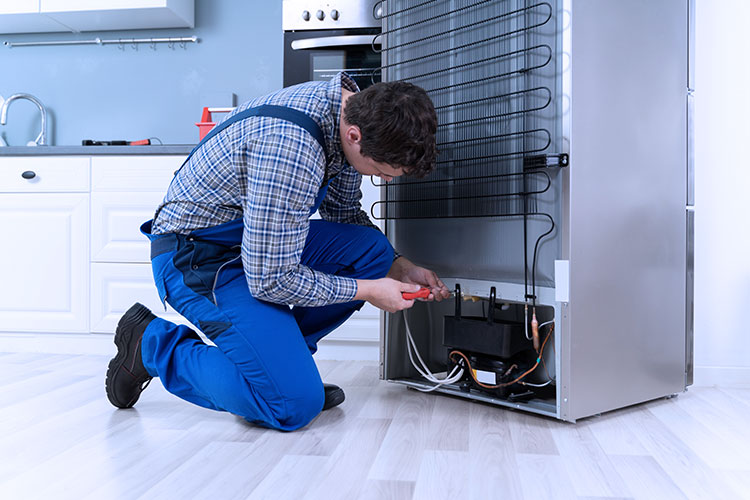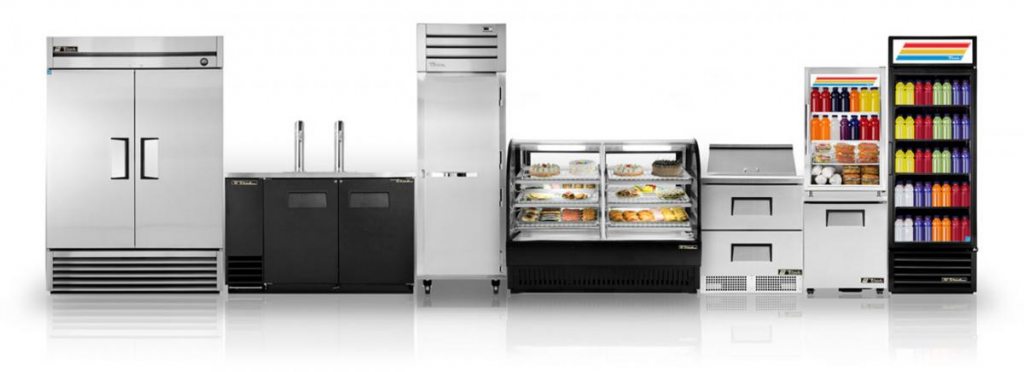Important Tips for Effective Ref Repair Work to Extend Home Appliance Life Expectancy
When it comes to your refrigerator, proper repair service and maintenance are important for long life. Comprehending typical troubles and knowing when to act can make all the difference.
Understanding Usual Fridge Problems
Refrigerators are essential in maintaining your food fresh, but they can encounter an array of common problems that disrupt their performance. One regular problem is poor cooling. If you notice food spoiling quicker than usual, check the thermostat settings or think about if the door seals are harmed. One more usual trouble is too much sound, which could show a malfunctioning compressor or a stopping working fan. You may also experience water merging inside or below the refrigerator; this commonly arises from a clogged up defrost drain or a faulty water line. Additionally, if your refrigerator's light isn't functioning, it can be a basic bulb issue or an issue with the door switch. Lastly, ice buildup in the freezer can impede airflow and cooling down effectiveness. Recognizing these concerns early can conserve you time and cash in repairs, ensuring your fridge runs smoothly and effectively.
Routine Upkeep Practices
To maintain your home appliances running efficiently, you require to remain on top of regular upkeep methods. Tidy the condenser coils, examine the door seals, and monitor the temperature setups to guarantee peak performance. These straightforward tasks can save you money and time on fixings down the line.
Tidy Condenser Coils Consistently
Cleansing your condenser coils consistently can considerably improve your appliance's effectiveness. Dirt and dust develop up on these coils over time, creating your home appliance to work harder and take in even more energy. To maintain them tidy, disconnect your device and carefully get rid of any safety covers.
Inspect Door Seals
3 straightforward steps can aid you ensure your device's door seals remain in great problem. Examine the seals routinely for any cracks, rips, or signs of wear. These problems can lead to air leakages, impacting efficiency. 2nd, clean the seals making use of cozy, soapy water to get rid of any debris or grime. A tidy seal guarantees a limited fit and better performance. Ultimately, execute a simple test by closing the door on a paper. If you can easily pull it out without resistance, the seal could require changing. By adhering to these steps, you'll keep your appliance's efficiency and long life, conserving you money on power costs and repair work in the future.
Monitor Temperature Level Settings
Regularly monitoring your appliance's temperature settings is vital for finest efficiency and performance. Whether you're handling a refrigerator, freezer, or stove, keeping an eye on these settings can avoid several problems. For refrigerators, go for temperature levels between 35 ° F and 38 ° F; for fridges freezer, linger 0 ° F. If the temperature levels are too expensive or low, your device might function harder, wasting energy and reducing its life expectancy. Make use of a thermostat to check these setups regularly, specifically after significant modifications, like moving your home appliance or changing the thermostat. If you observe variations, readjust the settings accordingly and seek advice from the customer manual for assistance. By staying aggressive concerning temperature monitoring, you'll assure your devices run efficiently and last much longer.
Fixing Cooling Problems
When your fridge isn't cooling down correctly, it can bring about ruined food and wasted cash, so resolving the concern without delay is vital. Start by inspecting the temperature level settings to validate they go to the advised levels, generally around 37 ° F for the refrigerator and 0 ° F for the fridge freezer. If the settings are correct, inspect the door seals for any kind of gaps or damage; a malfunctioning seal can allow warm air to enter.
Inspect the condenser coils, usually situated at the back or bottom of the device. Tidy them with a vacuum cleaner or brush to enhance performance. If issues persist, it could be time to call a professional.
Dealing With Water Leakage and Ice Accumulation
If you're managing water leak or ice build-up in your appliance, it's important to identify the resource of the problem. By pinpointing where the water is coming from, you can prevent further concerns and stay clear of expensive fixings. Let's check out some reliable techniques to deal with these usual problems.
Identify Leak Resources
How can you effectively identify the sources of water leak and ice accumulation in your home appliances? Begin by examining the seals and gaskets on your fridge and freezer doors. A used or damaged seal can enable cozy air to go into, creating condensation and ice. Next, examine the drain pan and water drainage system for clogs or clogs; a backed-up drain can cause water pooling. Seek any loose connections in the water supply line, which can produce leakages. Check out the defrost drain for ice accumulation, which might interfere with appropriate drainage. By methodically examining these areas, you'll pinpoint the source of the trouble, permitting you to take the necessary steps to fix it and prolong your device's lifespan.
Prevent Ice Formation
To stop ice formation in your devices, start by confirming the temperature settings are appropriate. If your fridge or fridge freezer is too cold, it can result in extreme ice build-up. Inspect the door seals frequently; harmed seals can allow cozy air in, causing condensation and ice formation.
Keep the appliance well-ventilated and prevent congestion, as this can block airflow - Washing Machine Repair Dependable Refrigeration & Appliance Repair Service. Regularly defrost your fridge freezer if it doesn't have an automatic defrost function.
If you discover water leakage, recognize and take care of any obstructed water drainage openings, as they can add to ice accumulation. Ultimately, tidy the coils and validate they're functioning correctly to maintain peak performance. Taking these actions will assist extend your home appliance's lifespan and effectiveness.
Dealing With Noisy Fridge Appears
While it may appear worrying, a loud refrigerator usually indicates small issues as opposed to major breakdowns. First, identify the source of the noise. Typical offenders consist of the compressor, fans, and water lines. If you listen to a buzzing sound, it may be the compressor striving; this could simply be a typical operation sound.
Next, look for loose products inside. Occasionally, containers or shelves can rattle, creating unwanted noise. Tighten or rearrange them to get rid of the noises.
If you observe a clicking sound, it could be the defrost timer. This is generally harmless however could suggest it needs inspection.
An out of balance device can generate resonances and noise. GE appliance repair Oro Valley Dependable Refrigeration & Appliance Repair Service. Addressing these concerns immediately can help keep your refrigerator's performance and lengthen its life expectancy.
When to Replace Components vs. Full Substitute

Nonetheless, if your appliance is older and experiencing multiple problems, a complete substitute could be much more cost-efficient. Consider the expense of fixings versus the appliance's value. If repair services go beyond 50% of a brand-new unit's price, it's browse around here typically smarter to purchase check these guys out a substitute. Additionally, if you discover continuous issues that maintain reoccuring, it's a sign that your appliance has reached the end of its life. Weigh these elements very carefully to make the very best choice for your demands and budget.
Understanding When to Call an Expert
How can you inform when it's time to call in a specialist for home appliance repair work? If your appliance quits functioning entirely or often journeys circuit breakers, it's an additional red flag.
You ought to also consider your very own comfort level with fixings. If you're unclear concerning identifying the issue or lack the right devices, it's best to connect for assistance. Bear in mind, trying challenging fixings can bring about even more damage and even safety and security hazards.

Often Asked Inquiries
How Often Should I Clean the Refrigerator Coils?
You must clean your refrigerator coils every 6 months. This aids maintain effectiveness and protects against overheating. If you discover extreme dirt or pet hair, tidy them extra frequently to guarantee your fridge runs efficiently.

Can I Use Vinegar for Cleansing My Refrigerator?
Yes, you can utilize vinegar to cleanse your refrigerator! It's a superb all-natural cleaner that removes smells and discolorations. Refrigerator repair experts Dependable Refrigeration & Appliance Repair. Simply mix it with water, use it to surface areas, and wipe down for a fresh, tidy refrigerator
What Temperature level Should My Refrigerator Be Establish To?
You ought to establish your refrigerator to 37 ° F(3 ° C) for excellent food preservation. This temperature level maintains your food fresh while stopping perishing, guaranteeing your grocery stores last much longer and lowering waste. It's a very easy modification you can make!
Does a Refrigerator Need to Be Leveled?
Yes, your fridge requires to be leveled. If it's unequal, it can influence cooling down effectiveness and cause excess sound. Inspect the leveling legs and adjust them to assure appropriate balance for ideal efficiency.
Exactly How Can I Decrease Refrigerator Power Usage?
To decrease your fridge's power consumption, keep it tidy and well-ventilated, examine door seals for leakages, set hop over to these guys the temperature level between 35-38 ° F, and avoid straining it. These steps can considerably decrease your energy costs.